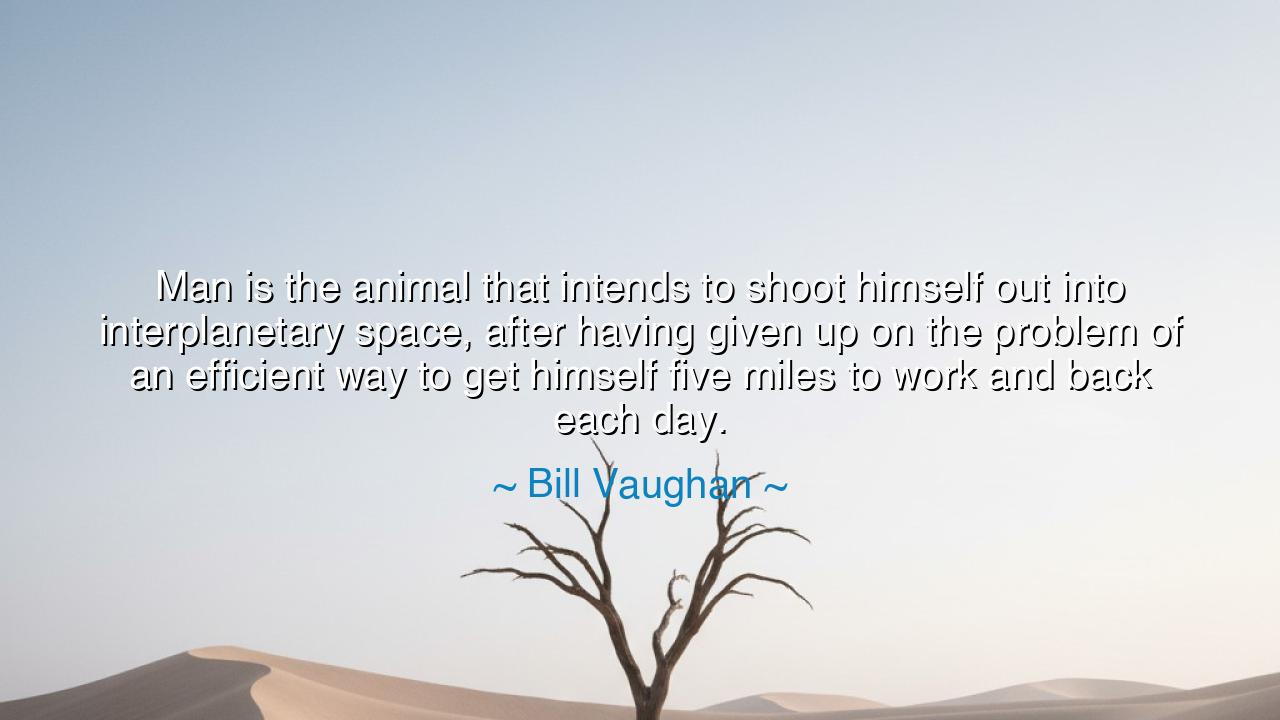
Man is the animal that intends to shoot himself out into
Man is the animal that intends to shoot himself out into interplanetary space, after having given up on the problem of an efficient way to get himself five miles to work and back each day.






In the great expanse of human history, we have long seen ourselves as beings destined to transcend the very limits of earthly existence. From the first sparks of discovery to the towering ambitions of our most recent explorations, we are creatures driven by the desire to reach beyond the stars, to conquer the cosmos. And yet, as Bill Vaughan humorously observes, “Man is the animal that intends to shoot himself out into interplanetary space, after having given up on the problem of an efficient way to get himself five miles to work and back each day.” This paradox strikes at the very heart of human nature: we are capable of the most audacious ambitions and grand visions, yet we often fail to solve the mundane problems that lie directly in front of us.
How often have we dreamed of the future, imagining the day when we might travel between planets, when the vastness of the universe becomes as accessible as the nearest city? But while we set our sights on the distant stars, the simple task of getting to work remains an unsolved riddle. The technological marvels we envision for the future—rocket ships, interplanetary colonies—are indeed awe-inspiring. Yet, the small, everyday challenges that we face seem to confound us again and again. This discrepancy between our lofty aspirations and our failure to address the simple, practical tasks of life is a reflection of a deeper truth about the human condition: we are driven by ambition, but sometimes blind to the immediate needs of our world.
Consider the story of the Great Pyramid of Giza, one of the ancient wonders of the world. It was built with such precision and grandeur, a testament to the vision and ambition of the ancient Egyptians. Yet, for all their ingenuity in building one of the most magnificent structures in human history, they had not devised an efficient system for water management or waste disposal within their society. They could gaze at the stars and imagine great feats, but some of their most practical needs remained unmet. In this way, the ancient Egyptians embodied the same paradox Vaughan describes: an ability to reach for the heavens, yet a struggle with the small and simple problems at their feet.
Similarly, in our own time, we find that the space race of the 20th century—led by great minds like Wernher von Braun and Neil Armstrong—was marked by a quest for greatness in the form of reaching the moon. Yet, in parallel, the global issues we face on earth—poverty, inequality, climate change—are much harder to address. Vaughan’s words remind us of this delicate balance: the great aspirations of mankind often outstrip our ability to address the real challenges of our everyday lives. It is as if we, too, are caught between wanting to reach for the stars while struggling to tend to the earth beneath our feet.
So, what is the lesson to be learned from this paradox? Perhaps it is a call for greater balance in our lives. Vaughan’s reflection is not just about the absurdity of grand ambitions, but about the discrepancy between our dreams and our practicality. It is a reminder that while it is noble to dream of space and explore the stars, we must also tend to the world around us. The small, everyday struggles—the simple tasks of life—must not be neglected in the pursuit of grander goals. If we are to build a future worthy of the stars, we must first ensure that we can navigate the roads of our own world.
Let us strive, then, to not be blinded by our visions of grandeur, but to attend to the needs of today. Whether it is finding a better way to travel, to communicate, or to coexist, we must tackle the mundane problems as diligently as we chase our loftiest ambitions. Man’s true greatness lies not only in his ability to dream of the stars but in his capacity to solve the problems of the earth that make those dreams possible. It is in the balance of vision and practicality that we will truly move forward—not just to the stars, but to a better, more sustainable world here on Earth.
So, in our own lives, let us not wait for the future to solve our present challenges. Let us embrace the task of living practically, while still reaching for the heights of our potential. For it is in our ability to balance ambition with action, to dream big but also solve small problems, that we find the true essence of human achievement.






AAdministratorAdministrator
Welcome, honored guests. Please leave a comment, we will respond soon